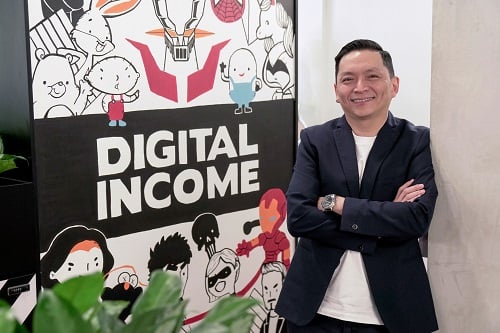

In a mostly old-fashioned industry such as insurance, digital transformation is a stumbling block for many companies. To learn more about how insurance can keep up with the digital age, we spoke with Peter Tay (pictured), chief operating officer of Singaporean insurer Income.
“Income’s foray in the innovation space was when we launched Income Future Starter in 2014 as a $100K challenge in support of start-up innovations,” Tay told Insurance Business. “The intent then was to connect and engage with the ecosystem to explore possibilities and we received encouraging outcomes which spurred us to sharpen our position.
“It became an insurtech accelerator programme in 2016 and, through that, we successfully collaborated with start-ups and introduced insurance offerings in the market, namely the ‘Jiffy Jane’ travel insurance chatbot and ‘Accident Reporting by Income’, which is a mobile application that allows Income motor policyholders to submit an accident report remotely.”
It was through this experience that Income realised that it had to create a dedicated office to champion and drive digitisation and innovation, Tay said. As a result, the company established the Digital Transformation Office (DTO) in 2016, with the aim of being a leading digital insurer in Singapore.
“We were clear at the start about the purpose of the DTO, which is to go beyond accelerators to jumpstart and empower co-collaboration and co-innovation with start-ups, but to operate like one to reimagine and transform insurance,” he said. “Founded on experimentation, DTO operates like a start-up to see how we may disrupt ourselves as we learn to build a viable digital business model for Income.”
The firm’s digitalisation efforts have earned recognition from the Applied Innovation Institute (AII), which saw Income topping 24 other insurers in the 2018 Singapore Insurance Innovation and Digital Benchmark. The company’s Future Starter programme, formation of DTO, well-received online claims system, and high Google search rankings gained the judges’ nod.
“Our push into the insurtech space, which combines big data and behavioural science to reduce underwriting risk and improve user experience in initiatives such as Drive Master and FlexiMilesage, also gave Income a high score,” Tay said.
“This is a testament to our journey as Singapore’s leading digital insurer. Our impetus for innovation and digitisation has always been customer-centricity, and we are constantly challenging ourselves to ideate insurance propositions that play to the way customers access, engage and use information digitally these days.”
Instilling a culture of innovation
According to Tay, the insurance industry is fairly traditional and conservative given that it is legacy-laden, especially in areas such as its systems, infrastructures, and underwriting processes. However, this means that is also largely stable and successfully built on traditional means. As such, brand and trust still matters when consumers think about insurance companies.
“We also recognise that customers are increasingly accessing and engaging with information digitally in today’s digital age, and it has become important for us to offer customers choice and flexibility to engage with us digitally if they choose to,” he said. “Given this landscape, it became a business imperative for Income to transform our business digitally so as to future-proof ourselves.”
He shared that, earlier this year, DTO relocated to a new facility to serve as a “hothouse” for innovation. Income is also easing in its staff, many of which are still used to the traditional way, into the company’s digital operations.
“To be a digital insurer, we recognise that customers must experience us digitally, not only with specific online offerings but also our core insurance business,” he said. “To bridge this mindset shift to the core insurance business, it is important that internal stakeholders, especially business owners, see DTO as collaborative and non-threatening.
“At the employee level, it was also important to have amongst us change makers. We are sensitive about potential tension that may result from new and old. Hence, we have incumbent staff who work within DTO to serve as an effective bridge.”
In partnership with the human resources team, all Income staff will be trained on the design-thinking approach, which holds empathising with customers central to its method of solving problems, Tay said. The company also had its staff join IdeaSmash, a 36-hour idea hackathon which challenged participants to think and act like a start-up to innovate and resolve a problem statement.
In order to allow its employees to experience working digitally, Income also introduced a mobile HR platform and virtual office access.
Equipping agents for the future
Despite massive investments in digital channels, Tay believes that traditional channels are not completely obsolete, and giving customers the power of choice on how to obtain the insurance they need is most important.
“We strongly believe in a multichannel strategy and will continue investing in both digital and traditional channels,” he said. “Hence, it is so important that Income has a quality network of financial advisers who are ready to add value with their high-touch engagements and advisory. In this regard, we understand that our advisers need to compete in an increasingly digitised environment, which is why we continue to invest in them through training and empowering them with digital tools to bring their advisory upstream.”
Moving forward
According to Tay, Income’s future plans lie in three core areas.
“First, insurance becomes more lifestyle-focused and we will home in to mitigate customers’ pain-points and offer a good customer experience,” he said. “Second, we will become more tech and data-driven for more customised engagements with customers – this includes empowering our agents with such tech and data to add value to their advisory work. And third, building and sharpening our capabilities to bridge seamlessly online to offline and vice versa since this will truly epitomise our true strength as a striving multichannel insurer.”
